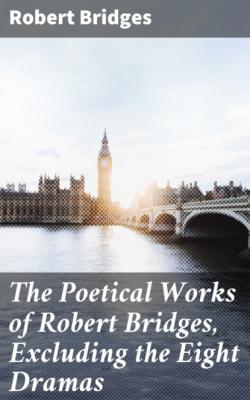The Poetical Works of Robert Bridges, Excluding the Eight Dramas. Bridges Robert
Читать онлайн.| Название | The Poetical Works of Robert Bridges, Excluding the Eight Dramas |
|---|---|
| Автор произведения | Bridges Robert |
| Жанр | Языкознание |
| Серия | |
| Издательство | Языкознание |
| Год выпуска | 0 |
| isbn | 4064066236861 |
Demand a sacrifice, and the king's son
Dreads the priest's knife, and all the city mourns. 940
Or shall I say what shameful fury it was
With which Poseidon smote Pasiphaë,
But for neglect of a recorded vow:
Or how Actæon fared of Artemis
When he surprised her, most himself surprised:
And even while he looked his boasted bow
Fell from his hands, and through his veins there ran
A strange oblivious trouble, darkening sense
Till he knew nothing but a hideous fear
Which bade him fly, and faster, as behind 950
He heard his hounds give tongue, that through the wood
Were following, closing, caught him and tore him down.
And many more thus perished in their prime;
Lycaon and his fifty sons, whom Zeus
In their own house spied on, and unawares
Watching at hand, from his disguise arose.
And overset the table where they sat
Around their impious feast and slew them all:
Alcyonè and Ceyx, queen and king,
Who for their arrogance were changed to birds: 960
And Cadmus now a serpent, once a king:
And saddest Niobe, whom not the love
Of Leto aught availed, when once her boast
Went out, though all her crime was too much pride
Of heaven's most precious gift, her children fair.{32}
Six daughters had she, and six stalwart sons;
But Leto bade her two destroy the twelve.
And somewhere now, among lone mountain rocks
On Sipylus, where couch the nymphs at night
Who dance all day by Achelous' stream, 970
The once proud mother lies, herself a rock,
And in cold breast broods o'er the goddess' wrong.
In. Now hush thy fear. See how thou tremblest still.
Or if thou fear, fear passion; for the freshes
Of tenderness and motherly love will drown
The eye of judgment: yet, since even excess
Of the soft quality fits woman well,
I praise thee; nor would ask thee less to aid
With counsel, than in love to share my choice.
Tho' weak thy hands to poise, thine eye may mark 980
This balance, how the good of all outweighs
The good of one or two, though these be us.
Let not reluctance shame the sacrifice
Which in another thou wert first to praise.
Ar. Alas for me, for thee and for our children,
Who, being our being, having all our having,
If they fare ill, our pride lies in the dust.
In. O deem not a man's children are but those
Out of his loins engendered—our spirit's love
Hath such prolific consequence, that Virtue 990
Cometh of ancestry more pure than blood,
And counts her seed as sand upon the shore.
Happy is he whose body's sons proclaim
Their father's honour, but more blest to whom
The world is dutiful, whose children spring
Out of all nations, and whose pride the proud
Rise to regenerate when they call him sire.
Ar. Thus, husband, ever have I bought and buy
Nobleness cheaply being linked with thee.
Forgive my weakness; see, I now am bold; 1000
Tell me the worst I'll hear and wish 'twere more.{33}
In. Retire—thy tears perchance may stir again.
Ar. Nay, I am full of wonder and would hear.
Pr. Bid me not tell if ye have fear to hear;
But have no fear. Knowledge of future things
Can nothing change man's spirit: and though he seem
To aim his passion darkly, like a shaft
Shot toward some fearful sound in thickest night,
He hath an owl's eye, and must blink at day.
The springs of memory, that feed alike 1010
His thought and action, draw from furthest time
Their constant source, and hardly brook constraint
Of actual circumstance, far less attend
On glassed futurity; nay, death itself,
His fate unquestioned, his foretasted pain,
The certainty foreknown of things unknown,
Cannot discourage his habitual being
In its appointed motions, to make waver
His eager hand, nor loosen the desire
Of the most feeble melancholy heart 1020
Even from the unhopefullest of all her dreams.
In. Since then I long to know, now something say
Of what will come to mine when I am gone.
Pr. And let the maid too hear, for 'tis of her
I speak, to tell her whither she should turn
The day ye drive her forth from hearth and home.
In. What say'st thou? drive her out? and we? from home?
Banish the comfort of our eyes? Nay rather
Believe that these obedient hands will tear
The heart out of my breast, ere it do this. 1030
Pr. When her wild cries arouse the house at night,
And, running to her bed, ye see her set
Upright in trancèd sleep, her starting hair
With deathly sweat bedewed, in horror shaking,
Her eyeballs fixed upon the unbodied dark,
Through which a draping mist of luminous gloom{34}
Drifts from her couch away—when, if asleep,
She walks as if awake, and if awake
Dreams, and as one who nothing hears or sees,
Lives in a sick and frantic mood, whose cause 1040
She understands not or is loth to tell—
Ar. Ah, ah, my child, my child!—Dost thou feel aught?
Speak to me—nay, 'tis nothing—hearken not.
Pr. Ye then distraught with sorrow, neither knowing
Whether to save were best or lose, will seek
Apollo's oracle.
In. And what the answer?
Will it discover nought to avert this sorrow?
Pr. Or else thy whole race perish root and branch.
